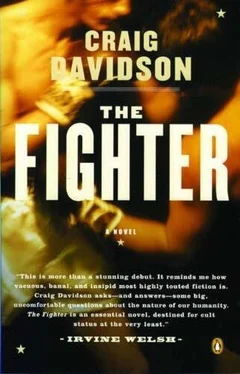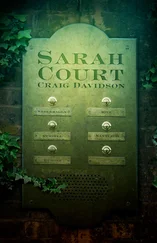Rob couldn’t help but smile. His uncle earned fifteen bucks a round as a sparring partner. He’d surrendered all dreams of boxing glory, fast cars, and HBO pay per views, the fame and pretty things. The biggest surprise was that it failed to eat at him: anytime he and Rob watched a title fight and one contender took a canvas nap, Tommy’d say, “Jeez, poor guy. Wouldn’t want to be in his shoes.”
Rob dropped back in on the gym bums’ conversation.
“It’s common knowledge,” the other bum said, “that of all creatures to swim the sea or walk on land, horses have the thinnest of skulls. Thin as eggshell!
Now a heavyweight of mine knocked out a donkey. The donkey head’s mostly bone, brain no bigger than a walnut — takes a mighty biff. We were training down west of San Angelo and he’d been drinking. He was a Mexie and Mexies’ll fight with two broke arms but are not at all keen on training. He’s drunk and staggers out the gym. There’s this old burro chewing cud; my guy goes to pet it — sour cuss bites him! Well didn’t he smack that donkey and it tips right over, four legs twitching up at the clear blue sky. Hang me if I’m lying.”
Neither questioned the other’s obvious fabrications. Since every word that exited a gym bum’s mouth was nearly by definition a lie, it was in their best interest to maintain an air of mutual acceptance, tolerance, or plain ignorance. Without lies, gym bums would have precious little to talk about.
“Robbie,” Reuben said, coming downstairs and flicking his head toward the ring.
“Quit eyeing your uncle Tommy. May as well watch a cripple fight, for all it’s worth — gonna pick up bad habits.”
“Well, aren’t you a peach,” Tommy said.
“You punch like a lollipop,” Reuben told his brother. “Head down to the Legion, find some veteran to fight — some blind old biplane pilot. That’s about your speed.”
In riposte, Tommy laid his substantial weight on the middle ring rope and extended a beckoning hand. “Why don’t you climb on in here and let’s go a few rounds, Ruby? Tell you what — the first shot’s free.”
“I got training to do.”
“You couldn’t train circus fleas.”
“How about you pinch that cut under your nose shut.” Reuben demonstrated by pinching his own lips shut. “Give it time to heal.”
“Ah… wah?” Tommy raised a glove to his lips, paused, then nodded. “…good one.”
Reuben smiled, the victor. “Robbie, don’t you know it’s impolite to stare at cripples? Go hit a bag.”
Rob pulled on a pair of sixteen-ounce gloves and approached a duct-taped heavybag.
Crouched low, left foot before right, and tipped forward on his toes, he snapped left jabs. He circled the bag, breaking at the waist, shouldering it, uncorking right hooks and doubling up on body shots.
All activity in the gym stopped when Rob hit the heavybag; everyone stopped and stared. He’d hear the whispers: Kid’s got bottled lightning in those hands; a little of the ol’ boom boom. Boy’s so quick you couldn’t hit him with a handful of sugar. Tall and in excellent condition, Rob weighed only 164 pounds. But his body had the characteristics of a puppy dog — big bones, huge paws — that indicated he had another growth spurt in him.
Tommy’s sparring session drew to a close. Scarpella was wheezing like a busted squeezebox; Tommy patted him on the head and, picking up the same tune he’d been whistling climbing through the ropes, ’ climbed out again.
“Don’t load up so much,” Reuben hollered at his son. “Power thrills but speed kills, Robbie. Get that through your thick head.”
“Dogging him somethin’ awful today,” Tommy said to his brother.
“Mind your business,” Reuben told him. “Don’t hear me telling you how to drive forklift, do you?”
“Just seems that, Robbie was a dog, I’d be calling the humane society right about now.”
“What’s he made of, glass? Throw your sweatshirt on,” he called over to Rob.
“We’ll hit the Green Machine.”

The Green Machine was an olive-green ’69 Dodge pickup donated to Top Rank under dismal circumstances: its owner, an ex-club member, was currently a guest of the state at Coxsackie penitentiary. The club could’ve found use for used gym mats or even foul cups, but the old green beater served no earthly good; it had sat in the crushed-gravel lot out behind the club for a year until Reuben devised a novel use for it.
Bolting a wooden beam to the cab roof and suspending an old heavybag from the end, he’d created an unorthodox training device. The bag hung four or five feet in front of the truck’s grille: the visual effect was of the classic carrot-on-a-stick incentive, with the bag as the carrot and the truck standing in for the donkey.
“Get the lead out!” Reuben shouted at his son. “Quit doggin’ it!”
Reuben hopped into the truck. The engine yammered and chuffed. “Come on, you old pig!” The Dodge shuddered to life; the cab filled with greasy exhaust fumes. He cracked a window and said “Put up yer dukes” as he slipped the truck into gear.
Rob backpedaled as the truck came at him at five mph; he threw punches at the frost-glazed bag chained to the beam. The idea was to punch while moving back on his heels — when pursued in the ring, he could lash out and catch his advancing opponent. To mix it up Reuben would set the Green Machine in reverse, forcing Rob into the role of pursuer. Around and around the crushed-gravel parking lot they would go, Rob alternately pursuing and retreating as his father hollered instructions out the window. The engine frequently died; Reuben would mash the gas pedal and crank the key, beseeching Rob to “keep punching, keep punching; your next opponent isn’t likely to conk out like this damn truck!”
A few other trainers had added the Green Machine to their workout regimen, much to the chagrin of their charges. Boxers complained of sore hands afterward, especially when it was cold and the bag nearly frozen. Every so often the Green Machine vanished from the parking lot — it wasn’t hard to steal, as the keys stayed in the ignition. It was always a boxer who’d taken it, frequently the night before his next training session. But the respite was short-lived: sooner or later the club would receive a phone call detailing the truck’s whereabouts and Reuben or one of the other trainers would retrieve it.
Reuben goosed the gas pedal and the truck lurched forward. Rob ducked the bag nimbly, stinging it with a hard right hand. Watching his son through the crack-starred windshield, Reuben marveled, as he so often did, at his unstudied perfection.
The way he moved, sly feints and weaves. Incremental movements, nothing frivolous or wasted. The beauty of his style lay in its geometries: the clean angular planes of his body, the straight lines by which he negotiated the distances between his opponent’s body and his own. To watch Rob box was beautiful in the way a predatory cat stalking its quarry was beautiful: generations of selective breeding honed to a killing edge. Whenever he despaired that he was pushing his son too hard, Reuben convinced himself that boxing was Rob’s life calling — how else could he be so damn good at it?
Of course, it never benefited a trainer to let his boxer know how good he looked.
“What’s the matter,” he hollered, “got lead in your damn feet? Pitiful, Robbie, just pitiful! Punch like that your next match, you better get used to the view from queer street.”
Reuben’s goading fell upon deaf ears. Rob knew he was a good boxer, a powerful and perhaps preternaturally skilled one: the whispers and stares told him so. But his skills also scared him. He’d never forget the first time he knocked a guy out: that bone-deep jolt traveling down his arm and his opponent’s distorted face rippling from the point of impact, how his eyes closed as he fell away from Rob’s glove. Afterward the fighter’s trainer found three teeth embedded in the semi-soft rubber of his gumshield. In Rob’s eighth fight, he broke his opponent’s jaw. Felix Guiterrez was a fellow senior at his high school; he’d seen Felix in the hallway with his mouth wired shut, sucking Boost through a straw in the cafeteria. He felt guilty knowing what he’d done. But on an instinctual level it felt like something he’d practically been bred for — how else could he be so damn good at it?
Читать дальше













